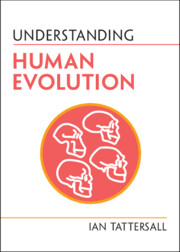Book contents
- >Understanding Human Evolution
- Series page
- Understanding Human Evolution
- Copyright page
- Reviews
- Dedication
- Frontispiece
- Contents
- Maps
- Foreword
- Preface
- Acknowledgments
- 1 Evolution
- 2 Technology: Dating, Diets, and Development
- 3 Discovery and Interpretation of the Human Fossil Record: The Early Days
- 4 Discovery and Interpretation of the Human Fossil Record: Later Developments
- 5 Early Bipeds
- 6 The Muddle in the Middle
- 7 Homo heidelbergensis and the Neanderthals
- 8 The Emergence and Spread of Homo sapiens
- Epilogue
- Summary of Common Misunderstandings
- References and Further Reading
- Figure Credits
- Index
Epilogue
Published online by Cambridge University Press: 21 July 2022
- >Understanding Human Evolution
- Series page
- Understanding Human Evolution
- Copyright page
- Reviews
- Dedication
- Frontispiece
- Contents
- Maps
- Foreword
- Preface
- Acknowledgments
- 1 Evolution
- 2 Technology: Dating, Diets, and Development
- 3 Discovery and Interpretation of the Human Fossil Record: The Early Days
- 4 Discovery and Interpretation of the Human Fossil Record: Later Developments
- 5 Early Bipeds
- 6 The Muddle in the Middle
- 7 Homo heidelbergensis and the Neanderthals
- 8 The Emergence and Spread of Homo sapiens
- Epilogue
- Summary of Common Misunderstandings
- References and Further Reading
- Figure Credits
- Index
Summary
The message from the population movements briefly recounted in the previous chapter is that Homo sapiens has been an itinerant species from the outset. Even in a world with intensively patrolled political borders there is no reason to believe that this propensity will be contained any time soon: It is an ongoing phenomenon that will have to be managed, hopefully as humanely as possible. More generally, the message deriving from the story told in this book is that we modern human beings have an astonishingly recent origin, and a sudden one. In evolutionary terms, we acquired our extraordinary symbolic reasoning capacities virtually overnight, and we did so exaptively (i.e., not in the context familiar today) rather than adaptively (within that symbolic context). What this most importantly tells us is that we cannot have been fine-tuned by natural selection over the eons to be the kind of creature we are today; there was simply not enough time. Which in turn suggests that, within the limits of circumstance, Nature has (albeit unintentionally) given human beings almost unlimited freedom to become the kinds of creatures they individually choose to be.
Keywords
- Type
- Chapter
- Information
- Understanding Human Evolution , pp. 148 - 150Publisher: Cambridge University PressPrint publication year: 2022

